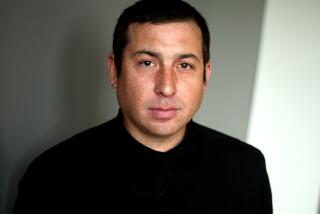Brothers Trace the Art of Throat Singing in ‘Genghis Blues’
- Share via
New York--At a recent performance here by Tuvan throat singer Kongar-ol Ondar, a man standing behind him onstage whipped out a cell phone and started dialing. A collective groan went up in the audience. After all, this was one of the great living practitioners of an extraordinary Central Asian folk tradition being upstaged by America’s cell-phone mania. (Throat singing, ironically, sounds like wind howling through telephone wires.)
It turns out that the caller, Adrian Belic, had a good excuse. He explained from the stage that he was trying to reach a blind African American blues artist and throat-singing aficionado named Paul Pena, who was ill in San Francisco with pancreatic cancer. Belic wanted Pena to hear Ondar, an old friend, sing.
If this sounds somewhat outlandish, it is. And that’s much like the documentary that features Pena and Ondar, “Genghis Blues,” which won an audience prize at this year’s Sundance Film Festival. Produced and shot by 29-year-old Adrian and his 27-year-old brother, Roko Belic, the film, which opens Friday in Los Angeles, follows Pena’s efforts to identify and later master throat singing.
Pena first heard this strange musical style on a shortwave radio transmission from Moscow. Pena then approached Ondar after one of his first-ever appearances in the States and serenaded him in Tuvan. Astonished, Ondar invited Pena to compete in a throat-singing contest in Tuva, an isolated, semiautonomous Russian republic near Mongolia that is notable for being completely obscure. There’s not much there except mountains, grasslands and bad Soviet architecture. Its culture is primarily nomadic, although the formerly independent government once issued postage stamps, which have since become collector’s items.
The story only gets weirder. It involves the late physics Nobel laureate Richard Feynman, the late KPFK disc jockey Mario Casseta, assorted hangers-on and the Belic brothers, who found themselves becoming de facto cultural representatives of Tuva (along with Ralph Leighton, head of a group called Friends of Tuva).
“It’s a Tuvan lifestyle choice that we’ve made,” says Adrian Belic, who is originally from Chicago but lives in San Francisco, as does Roko; this is the first film for both. “When there’s anything Tuva-related that happens in the Western hemisphere, one way or another we know about it or we help with it or they [Tuvan visitors] stay at our house.”
The brothers’ introduction to Tuva came as teenagers when they saw a documentary on Feynman that detailed his obsession with the place (though he never made it there). Fascinated, Roko kept his ear to the ground for all things Tuvan throughout high school and then college, at UC Santa Barbara (Adrian went to USC). After graduating, he called up Leighton, who had known Feynman and helped craft Feynman’s bestselling autobiography, “Surely You’re Joking, Mr. Feynman,” and said he wanted to make a documentary about Tuva. Leighton told Roko that perhaps he could fill in for a friend at the BBC who might be pulling out of a documentary he’d intended to shoot about Pena’s Tuva quest.
“I thought, ‘Wow, that’s the best opportunity I’ve ever had in my life,’ ” Roko says.
Roko got even more excited when he learned that Pena had worked with T-Bone Walker, B.B. King and Bonnie Raitt and penned the Steve Miller hit “Big Ol’ Jet Airliner.” Not surprisingly, financiers weren’t equally excited. The film eventually took the brothers four years to make, by way of credit cards, odd jobs and “a friend of a friend of Ralph’s sister-in-law’s business partner,” who let them use a corporate post-production facility in San Francisco.
“No one took us seriously,” says Adrian. “There’s this place called Tuva, which they don’t see on a map, and the Tuvans do this thing called throat singing, which they can’t believe can be done. And then there’s this blind guy who taught himself three styles through mimicking this thing that can’t be done in a place that doesn’t exist. We would like to go there and see this person invited by the most famous Tuvan throat singer. And they’d go, ‘Who are you guys?’ ”
Compounding the uncommercial nature of the project was Roko’s decision to include in the film, among others, Casseta, who was the first deejay in America to play Tuvan music; Lemon DeGeorge, a tree trimmer; and Tony Decicco, described by Roko as “a musician freaky dude,” who liked to make noise with instruments he’d never heard before. Although “Genghis Blues” is being marketed as a movie about two men from different cultures meeting and making music, it has the texture and inconsequence of a shaggy dog story--what Roko describes as “the eclectic character of the film, that there are so many weird things involved.”
Once the Belics got this motley crew to Tuva, they had the good fortune to encounter a series of unanticipated triumphs and near tragedies. The most dramatic moment comes when Pena discovers that a song he’s practiced for the competition cannot be sung because it was written by a banned writer. With the whole point of his trip--and the documentary--on the line, he goes onstage and ad-libs in Tuvan, to wild applause. The euphoria is short-lived, however, when Pena loses his antidepressant medication and Casseta suffers a heart attack.
Presiding over these events is the grinning, irrepressible Ondar. He takes the filmmakers on an impromptu Tuvan road trip, introducing them to his bewildered mother. He bonds with Pena, nicknaming him “The Earthquake” because of his deep, vibrating voice, and plying him with vodka. But he also contributes to the chaos during the shoot by breaking his hand in a street fight.
“I have a very low tolerance for people who do things that aren’t right,” Ondar says in Russian, translated by Roko over breakfast in a midtown Manhattan hotel. “So when I hear or see somebody do something that’s not right and that’s mean, I’ve been known to correct it in my own way, just like Mike Tyson.”
Ondar goes on to recount why he has such a low tolerance for people who do things that are not right. It reveals a side of him that belies his jovial on-screen persona. In his youth, he was beaten by his stepfather and ran with a street gang. He was jailed three months for fighting, went into the army then was jailed again, this time for four years, for a fight that involved a stabbing.
While in prison he developed his throat singing and in 1992 won the throat-singing contest that Pena entered three years later. His charisma is such that he has become the country’s leading cultural export and been elected to its parliament. He’s recorded throat-singing albums, toured Europe and the U.S. and now teaches throat singing at the national arts school, culling the countryside for potential candidates. He and the Belics are now trying to raise money so that Pena can visit the Cape Verde Islands, off the west coast of Africa, where Pena’s ancestors are from.
“We raised two grand at screenings in Telluride and a couple thousand in San Francisco,” says Roko. “I talked to Paul yesterday and said, ‘Paul, it looks like we got the money,’ and he said, ‘That’s great. I don’t even want to tell you guys this because I know you’ll figure out a way to make it work, but it would be the best if I could bring Kongar-ol over there. I bet that would be a hell of a time.’ ”
BE THERE
“Genghis Blues” opens Friday at the Sunset 5, 8000 Sunset Blvd., West Hollywood.
*
‘No one took us seriously. There’s this place called Tuva, which they don’t see on a map, and the Tuvans do this thing called throat singing, which they can’t believe can be done. And then there’s this blind guy who taught himself three styles mimicking this thing that can’t be done in a place that doesn’t exist.’
ADRIAN BELIC
Filmmaker
More to Read
The biggest entertainment stories
Get our big stories about Hollywood, film, television, music, arts, culture and more right in your inbox as soon as they publish.
You may occasionally receive promotional content from the Los Angeles Times.










